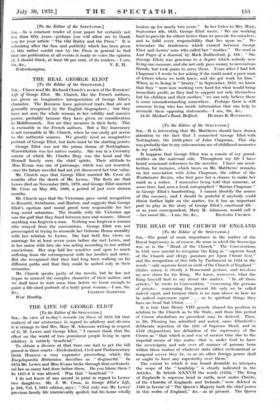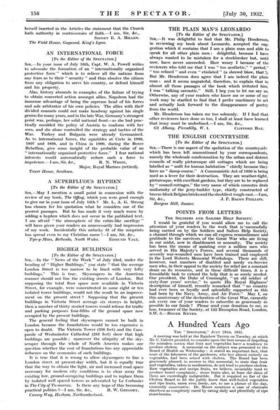THE HEAD OF THE CHURCH OF ENGLAND
[To the Editor of the SPECTATOR.] SIR,—The point of main importance in the matter of the Royal Supremacy is, of course, the sense in which the Sovereign was or is the " Head of the Church." The Convocations in 1531 were careful to recognize the King as " supreme head of the Church and clergy quantum per legem Christi fleet," and the recognition of this title by Parliainent in 1534 in the words " only supreme head on earth of the Church of England " (italics mine), is clearly a Romeward gesture, and involves no new claim for the King. We know, moreover, what the King himself had to say about the matter. " In all those articles," he wrote to Convocation, " concerning the persons of priests : concerning this present life only we be called indeed caput, and because there is no man above us here we be indeed suprentunt caput . . . as to spiritual things they have no head but Christ. . . ."
It is true that Henry VIII grossly abused his position in relation to the Church as to the State, and from this period of Crown absolutism no precedent may be derived. Then, as Dr. Fleming has admitted and noted, came Elizabeth's deliberate rejection of the title of Supreme Head, and in 1559 (Injunction) her definition of the supremacy of the Crown as " that which is and was of ancient time due to the imperial crown of this realm—that is, under God to have the sovereignty and rule over all manner of persons born within these realms of whatever state either ecclesiastical or temporal soever they be, so as no other foreign power shall or ought to have any superiority over them."
The extent to which it was found desirable to interpret the scope of the " headship " is clearly indicated in the Articles. In Article XXXVII the words (1553) " The King of Englande is supreme head in earth, next under Christe, of the Churehe of Englande and Irelande," were deleted in 1563 in favour of " The Queen's Majesty bath the chief power in this resilm of England," &c.—as at present. The Queen
herself inserted in the Articles the statement that the Church hath authority in controversies of faith.—I am, Sir, &c.,
SIDNEY E. A. MILLER.
The Field House, Gaywood, King's Lynn.































 Previous page
Previous page